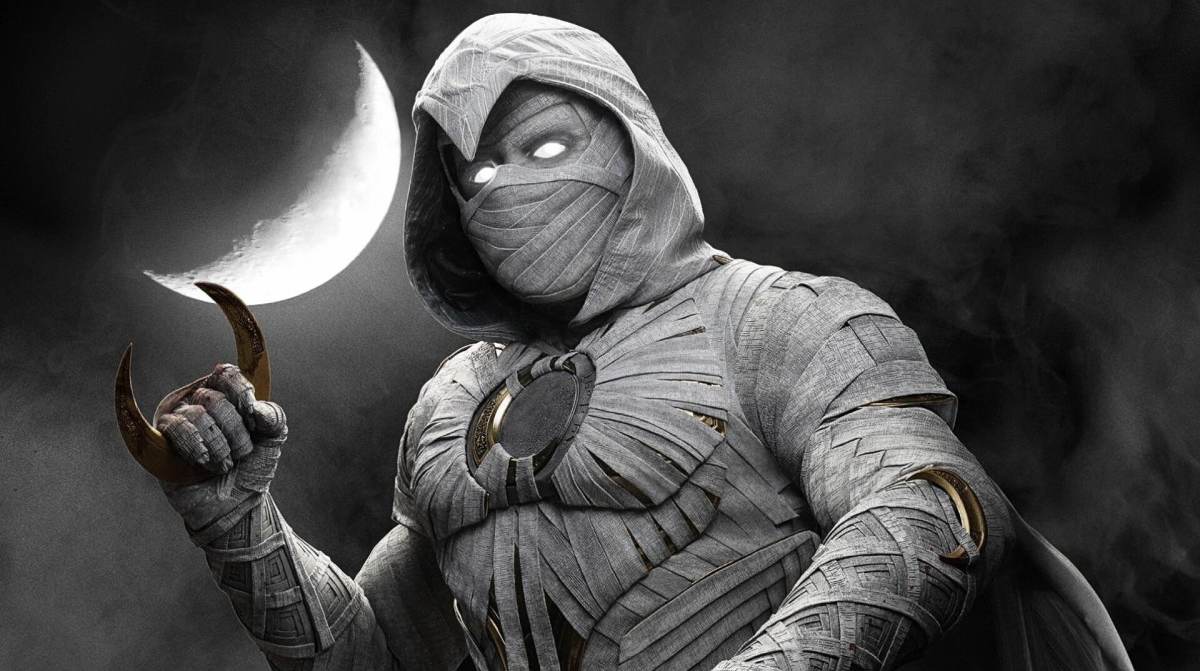This is a non-spoiler review of the first four episodes of Moon Knight, which begins airing on Disney+ on March 30.
Moon Knight is a solid and sturdy addition to the Marvel Cinematic Universe (MCU), perhaps more notable in what it attempts than what it accomplishes.
While the streaming series on Disney+ have introduced new characters like Kang the Conqueror (Jonathan Majors) or Kate Bishop (Hailee Steinfeld) to the universe, they have largely been built around established players. Characters like Wanda Maximoff (Elizabeth Olsen), Vision (Paul Bettany), Loki (Tom Hiddleston), Sam Wilson (Anthony Mackie), Bucky Barnes (Sebastian Stan), and Hawkeye (Jeremy Renner) had all played supporting roles in multiple projects before getting their own shows.
Moon Knight is the first of the Disney+ streaming shows to be built around an entirely new character to film or television, (except for a brief allusion to Captain America: The Winter Soldier). Indeed, one of the most refreshing aspects of the four episodes of Moon Knight previewed to press is the extent to which the show operates within its own corner of the shared universe. It feels distinct and separate, rather than an extension of an existing show or setup for a future event.
There is a compelling intimacy to Moon Knight, at least by the standards of the shows around it. The primary cast is relatively tight, consisting of three actors: Oscar Isaac, Ethan Hawke, and May Calamawy. Academy Award winner F. Murray Abraham provides the voice of Egyptian deity Khonsu, but the god himself appears via computer-generated imagery. There are obviously guest stars and extras, some of whom recur between episodes, but the central cast is surprisingly small.

It is interesting to wonder whether this is a concession to the production limitations on a show filming in the middle of the pandemic. After all, unlike Loki or Hawkeye, Moon Knight involved extensive location shooting outside of North America, shooting in both Hungary and Jordan. As with the decision to focus largely on new characters, the show’s choice of locations feels like a conscious effort to expand the MCU beyond the United States.
The show is initially set in London, a decision that Isaac credits to the fact that there are “too many characters in New York.” It may also be a pragmatic choice, given that Eternals suggested London could become a hub for characters like Black Knight (Kit Harington) or Blade (Mahershala Ali). The eponymous character would certainly fit comfortably in the milieu. While Budapest makes a somewhat unconvincing stand-in for London, it still makes for a somewhat novel setting.
Without delving into the realm of spoilers, it seems safe to concede that Moon Knight exists as a performance showcase for Oscar Isaac. Isaac is introduced as Steven Grant, who works at the gift shop in the British Museum. Grant’s memory is full of holes, and he frequently has blackouts. To prevent himself from waking up in unusual locations, Grant has taken to locking himself into bed every night. Naturally, that may not be enough to keep the character out of trouble.
Isaac is one of the most interesting actors of his generation but has largely demonstrated his talent in smaller films like A Most Violent Year or Ex Machina, as well as shows like Show Me a Hero or Scenes from a Marriage. Isaac’s bigger-budget work has been more scattershot. For every Dune, there is an X-Men: Apocalypse. For every Star Wars: The Last Jedi, there is a Rise of Skywalker. Isaac’s talents, which often lie in his dramatic intensity, have not always been best served by the demands of modern franchises.

Moon Knight is a little too beholden to the standard Marvel formula to let Oscar Isaac truly demonstrate his range. The show insists on tempering the character’s intensity and pathos with quippy one-liners and cheap jokes. However, Isaac brings a commitment to his work on the show that serves him well and benefits the series as a whole. The same is true of Ethan Hawke, who is given a largely thankless role as the ostensible villain Arthur Harrow, but he offers a steely intensity that plays well off Isaac.
Watching Moon Knight, there is a sense of watching Marvel Studios assess in real time what it thinks streaming audiences will let it get away with. Moon Knight is perhaps the most formally ambitious Marvel Studios project since WandaVision, particularly in terms of its themes and its visual storytelling. However, the show seems to be anxiously checking itself at every opportunity, as if afraid to be too weird despite having a large captive audience.
This is perhaps reflected in the decision to screen four of the six episodes for critics. As the email notice to critics pointed out, this represents the most significant chunk of any Marvel streaming series to be shown in advance of release. It suggests that the company isn’t entirely sure what it has in Moon Knight and that it is worried that what is apportioned out in individual episodes is not representative of the scope or scale of Moon Knight.
It is easy to understand this decision. There are flashes of brilliance in the two-thirds of Moon Knight that were available for preview and review. In particular, there are aspects in the fourth episode that seem to really connect with the show’s true potential. However, it is frustrating that it takes Moon Knight four episodes to build up the confidence to take a big swing like that, and it is doubly frustrating that, even when it makes those bold decisions, the show is constantly hedging.

As a superhero show that is about mental illness, the default point of comparison for Moon Knight will inevitably be something like Noah Hawley’s X-Men spin-off, Legion. However, Legion was truly avant garde, featuring choruses of “women with mustaches, singing” and epic animated musical battles. It spoils little to reveal that Moon Knight is a much more conventional show in terms of its storytelling and structure, which makes its timidness all the more unsettling.
The show also suffers from the limitations of the company’s house style. Pre-released interviews have made comparisons to movies like Raiders of the Lost Ark and Ghostbusters, and it is certainly possible to recognize references to these films at certain points in the series. However, there’s a certain shallowness to these shoutouts, particularly when compared to the way that Matt Reeves more assuredly draws from 1970s cinema or the films of David Fincher in The Batman.
Acknowledging these constraints, there is a lot to like in Moon Knight. There is some decent character work in the show, particularly concerning Steven Grant. The show understands that the central character’s superpowers and psychological condition work best treated metaphorically rather than literally. Moon Knight is a meditation on the idea of self and identity, in particular the question of self-knowledge and the challenge of reconciling different facets of oneself.
It is also nice to see Marvel Studios delving into the realm of the spiritual and cosmological, flirting with the tangled and abstract mythology of Moon Knight. One of the more frustrating aspects of the Thor franchise has been the insistence on treating Asgardians as sufficiently advanced aliens rather than exploring what it might mean for them to be actual mythological creatures. Moon Knight is too timid to fully embrace the weirdness and uncanniness of its concept, but it leans in that direction.
That, perhaps, is indicative of Moon Knight as a whole. The show pushes in interesting directions and gestures at interesting ideas, even if it ultimately seems afraid to follow through on the more ambitious of those concepts. Then again, perhaps this split personality is entirely appropriate for Moon Knight.






Published: Mar 29, 2022 11:30 am